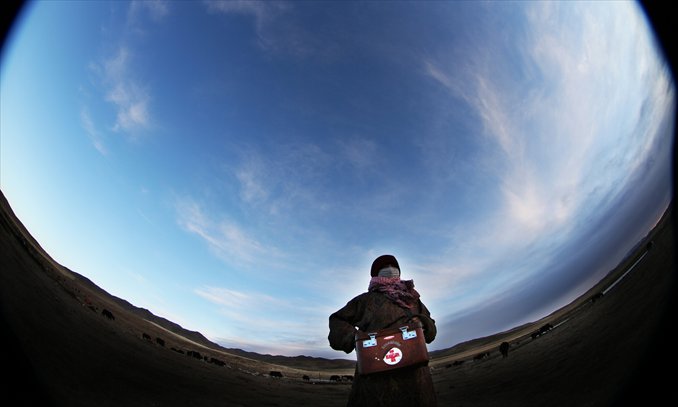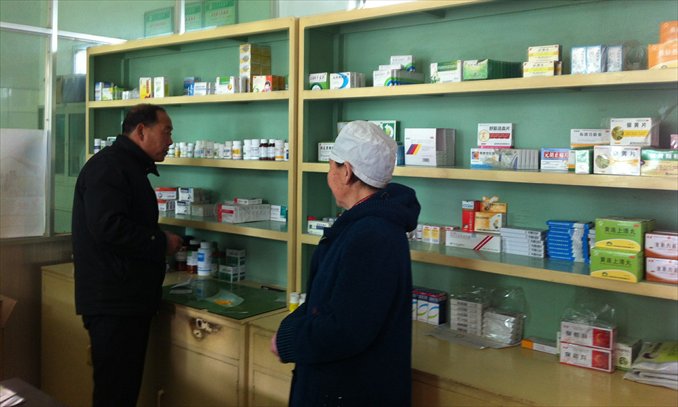Who cares for the village doctors?

Believing that their situation will one day improve, village doctors are working tirelessly to better the health conditions of rural areas. Shi Huaiqing is one of this group of about one million village doctors.
Shi, 52, hails from the village of Shijiagelao in Luochuan county, near the city of Yan'an in Shaanxi Province. He has been a doctor for 35 years and has been responsible ever since for the village's 268 households.
Shi felt deep regret over the death of a 30-year-old villager, who died during the Spring Festival holiday, after a night of drinking alcohol.
"It took me nine minutes to get to his house from when I got the phone call," he sighed. "If I had advanced medical instruments to help him breathe, if I …" Shi's voice trailed away as it would several times during the interview.
Shi was unable to fall asleep or to eat anything, afflictions that commonly haunt him when he is too busy visiting elderly or child patients in the dead of night. Such late house calls are routine for Shi. On the eve of Spring Festival, he visited one elderly woman at 2 am and a child an hour later. When people are celebrating the festival and the public hospital doesn't receive patients, turning to Shi is their only recourse.
Shi's plight is similar to that of Zhang Tao, 38, another village doctor from Wujiazhuang, with over 300 families.
"I often can't fall asleep after I come back from house visits, but I've become used to it," Zhang told the Global Times. He keeps close contact with Shi and regards him as an "idol."
Shi once met Li Keqiang, the incoming premier of the State Council, at the Great Hall of the People with 12 other village doctors selected from all over the country on January 5, 2010. He was also chosen as one of the four representatives to meet the press after the meeting.
He has been awarded many honors, and on the wall of his clinic hangs the group photo the village doctors took with Li.
While talking to the Global Times, he took several phone calls and received three villagers, all within half an hour.
"I enjoy being a doctor, and I'll keep learning to improve my medical skills," said Shi to the Global Times in his village clinic. However, he added that his medical expertise could not keep pace with the times. "Not only do we need training, but we need regular training," he said.
Major concerns
The job does involve some risks, considering the increasing number of disputes between doctors and patients in recent years.
"We're afraid of potential risks. Often, I am nervous about taking on a patient even if I am confident I can cure them," Shi said, adding that this definitely has increased the economic burden on villagers since they often have to travel far to town or county hospitals.
Salaries are low, which is why so few young doctors choose this path as a career. Shi is worried that no one is willing to take his position, including his son.
Shi receives 10,000 yuan ($1,605) a year in subsidies, which is much better than the situation years ago when he and Zhang barely earned 60 yuan a month. But despite this improvement, it is still far from enough. "In some mountainous areas, the subsidies are reasonable to encourage village doctors to keep working but in my county it's difficult," said Shi.
Luochuan county is well-known for its apples that sell internationally. This has allowed local farmers to boost their income, with flash cars appearing around the villages. This has meant that the subsidies for village doctors have paled in comparison to the yearly income of local families.
If it weren't for Shi and Zhang's wives making extra money working on their apple farms, the two doctors would have trouble supporting their families.
In May 2012, when local people were busy trimming the apples to ensure the larger ones grow to term, Zhang was awoken at 11 at night.
A 9-year-old boy was suffering from a high fever. Zhang only returned home hours later and gave up on his night's sleep.
"So long as I take on the job, I must try my best to do it well," he said. This is a pet phrase among village doctors, since Ma Wenfang also expressed this attitude to the Global Times in a phone interview.
Ma, 62, is from Suliuzhuang village, Tongxu county, Henan Province. He has been a doctor for over 40 years. "No matter how many honors I've got, I'm still a farmer and a village doctor. I'm always proud of this," he said.
Ma is a representative at the annual session of the National People's Congress (NPC) but still receives patients from his village and the surrounding areas.
Besides the poor salaries earned by village doctors, what most concerns Ma is who will take up the post when doctors like him retire. Ma has an idea about how to attract young graduates to work in the countryside.
"Village doctors should have a similar salary and social welfare as those working in town and county hospitals," he proposed.

Forgotten group?
Village doctors have been deemed as heroes fighting on the very frontline of the country's vast healthcare system. However, for decades, they have been officially considered as farmers, with practicing medicine only a part-time job - they are not on the public-owned hospitals' pay rolls and they are not covered by the pension system like other doctors working in the city hospitals.
When healthcare reform was carried out in recent years, which brought greater benefits to rural residents, these doctors seemed to be left behind. Mass petitions by village doctors were reported in many areas across the country, calling for greater respect and equal welfare with urban counterparts.
When village doctors were invited to meet Li Keqiang in January this year, one made his concerns very clear, namely a lack of training opportunities, inadequate facilities, great risk, low income and no pension.
In truth, the authorities have been trying to address these problems in recent years.
"They made just several hundred yuan a month. If they were treated the same way as village teachers (many included in government pay roll), many problems would have been solved," said Minister of Health Chen Zhu at the annual session of the National People's Congress in 2009 (NPC).
According to a report by the China News Service on January 25, the Ministry of Health said pilot programs for village doctors under contract will be carried out in some areas, and special subsidies will be provided while a pension system will be established.
No ordinary day
Zhang often drives his car to visit villagers, to make sure they take their injections on time or to carry out physical examinations.
The director of the town's hospital once joked to Zhang that even though his petrol costs aren't covered, he still uses his car for the job, recalled Zhang.
As far as he's concerned, the job requires enthusiasm and patience, but it's all worth it because it places him right at the center of the country's healthcare system, straddling both towns and villages.
These sub-divisions were meant to ensure that common ailments would be handled at the village level, with patients only visiting larger hospitals for more serious problems.
Zhang graduated from a clinic school in Yan'an after studying three years there. He has been a village doctor since 2000. "Within these years, I've learned a lot but I still need to keep learning to be a qualified doctor," he said.
Zhang can cure some common diseases such as colds and stomach bugs, but he cooperates with the local town hospital to promote the practice of State-run programs.
Urging villagers to have free medical examinations is a challenge. "Villagers usually value farm work more than their health," he said, adding that it's normal for him to turn to elderly people's children for help to persuade their parents to go to the hospital.
Working hard also takes a toll on doctors' relationships with their families. For Shi, some of his relatives think he does not care about family, as he is often late for relatives' weddings or funerals due to so much of his time being taken up with receiving patients.
Bleak retirement
Shi's colleague, Shi Shihong who worked in a nearby village, died at the age of 80 before the Spring Festival. His wish was also to improve the condition of retired village doctors.
Gu Linhai, a village doctor who had worked for over 40 years, has been living with cerebral palsy for a decade. Now he only gets 160 yuan a year as a pension, according to Shi.
Shi said his living conditions are much better than those of his colleagues who work in remote areas of the countryside, and therefore he has no excuse to give up his job, despite accepting conditions too forbidding for most.